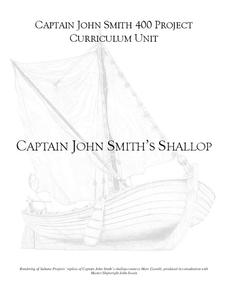Curated OER
Searching for a New Home
Students investigate pilgrims. In this pilgrim lesson, students read the book If You Sailed on the Mayflower and identify the path from England to Holland on a map. Students write in a journal about how they would feel if they were a...
Curated OER
The Lake Champlain Highway
Ninth graders read and color “Boats, Boats, Boats on Lake Champlain.” In this US History lesson, 9th graders listen to more detailed descriptions of the history of boating on Lake Champlain. Students draw a picture of a boat...
Curated OER
Sailors and Sharks
Learners use the skills of fleeing and dodging in order to avoid being tagged. They begin standing on the ships (mats). One student, the shark, wears a pinney. At the signal from the teacher of "Sailors swim", the sailors scatter to a...
Curated OER
John Fitch: Pioneer Steamboat Inventor
Students explore the transportation revolution brought about through the use of steam power to move boats over water. They practice note taking skills by taking notes from an article.
Curated OER
New Ship For the Old World
Students explore the age of sailing in the colonies through role-playing. In groups, they play the role of a business owner, shipbuilder and geographer to complete specific tasks. They participate in an old World trade show to...
Curated OER
Route Reconstruction
Students trace sailing route of Spanish and Portuguese exploration ships. They calculate and compare distances that different explorers traveled. Students calculate how long it would take to travel an explorer's route using different...
Curated OER
Environment: A Day Around the Bay
Young scholars examine various scenarios about pollution around bays and discuss their reactions to them. Among the situations they investigate are construction site soil washing into a tributary, oil from motor boats leaking into...
Curated OER
Crossing China By Sampan
Sixth graders determine the geographic features that facilitate and prevent communication and commerce between parts of China. They recognize a sampan, the traditional flat-bottomed boat used in Southeast Asia.
Curated OER
The Art and Science of Impressionist Color
Discover Impressionist painting as students investigate the 19th century combinations of colors characteristically used. Students experiment with their own paintings, utilizing primary and secondary colors.
Curated OER
Transportation Word Wall
In this vocabulary worksheet, young scholars learn about forms of transportation by studying 40 word and picture cards. One set is in color and the other in black and white. These cards are intended to be used on a word wall.
Curated OER
Captain John Smith's Shallop
Young explorers, all aboard the shallop to discover how early European explorers would navigate the American coastline to find resources, map terrain, and trade with Native American tribes.
Curated OER
Colors
Students learn about the Impressionist painters' use of color and how it connected to early nineteenth century scientific theories about color. In this colors lesson plan, students explore combinations of primary and secondary colors,...
Curated OER
Measure for Measure
Young mathematicians work to recognize the relationship between their scale models of the Joides research vessel and the real vessel. They calculate the relationships between various parts of the ship using fractions, ratios, and...
Curated OER
Sink or Float?
Students investigate whether different objects sink or float in water using the Scientific Method. They listen to the book "Christopher Columbus" by Stephen Krensky, identify the steps of the Scientific Method, conduct the sink or float...
Curated OER
Introduce Vocabulary: Puff, the Magic Dragon (Yarrow and Lipton)
Puff the Magic Dragon remains a childhood landmark for budding readers (and singers), but did you know it also makes an excellent vocabulary study? By focusing on several in-text words (in this case: billow, cease, fearless,...
NOAA
Ocean Exploration
Sea explorers and scientists have found that because of temperatures being two to three degrees Celsius at the bottom of the ocean, most animals are lethargic in order to conserve energy. In this web quest, pairs of learners read about...
Curated OER
Blowin' In The Wind
Students predict and hypothesize the reasons for wind movement. After viewing a video, they describe the effects of a high and low pressure system and what makes the wind blow. In groups, they construct instruments that measure air...
Curated OER
DESCRIPTIVE WORDS
Students examine descriptive language. In a worksheet activity, they practice writing a one-page description of an event, trying to use descriptive words. They also describe a noun, e.g. rabbit, using descriptive language.
Curated OER
Down to the Sea in Ships...Really!
Students discuss the travel of ancient sailors and the use of ships. They complete a Venn diagram, and compare and contrasts the two points of view on ancient ship travel.
Curated OER
The Last of the Really Great Whangdoodles Multiple Choice Quiz
In this literature based multiple choice quiz worksheet, students answer questions based on the book The Last of the Really Great Whangdoodles by Julie Andrews Edwards.
Curated OER
Christopher Columbus
In this Christopher Columbus worksheet, 3rd graders will read a six paragraph passage. Students will then answer seven multiple choice questions about what they have read.
Scholastic
Make a Mini Mayflower
Students discover the importance and history behind the Thanksgiving feast. Using walnut shells and toothpicks, they construct models of the Mayflower and simulate giving them to the Native Americans for helping the Pilgrims survive.
Curated OER
Island Sinker
Young scholars perform various locomotor skills while practicing cooperative teamwork. In this locomotor skill lesson, students move from "island" to "island" using the designated motor skill. Imaginative components such as escaping a...
Curated OER
The Blame Game
High schoolers research the sinking of the Lusitania. They work together to develop a position supporting an idea. They discover principles of international law and the rights of non-combatants in wartime.























